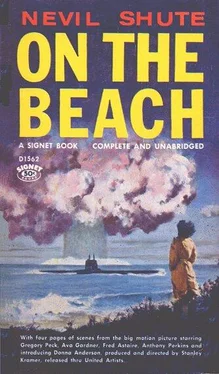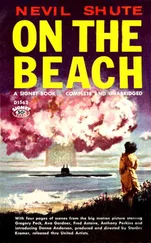"Come back safely, Dwight," she said softly.
He grinned. "Sure we’ll come back safely. We’ve been ordered to. The admiral wants his submarine back."
She sat back and laughed. "You’re impossible! As soon as I get sentimental you just—you just prick it like a toy balloon."
"I guess I’m not the sentimental type," he said. "That’s what Sharon says."
"Does she?"
"Sure. She gets quite cross with me."
"I can’t say that I’m surprised," she observed. "I’m very sorry for her."
They finished lunch, left the restaurant, and walked to the National Gallery to see the current exhibition of religious pictures. They were all oil paintings, mostly in a modernistic style. They walked around the gallery set aside for the forty paintings in the exhibition, the girl interested, the naval officer frankly uncomprehending. Neither of them had much to say about the green Crucifixions or the pink Nativities; the five or six paintings dealing with religious aspects of the war stirred them to controversy. They paused before the prizewinner, the sorrowing Christ on a background of the destruction of a great city. "I think that one’s got something," she said. "For once I believe that I’d agree with the judges."
He said, "I hate it like hell."
"What don’t you like about it?"
He stared at it. "Everything. To me it’s just phony. No pilot in his senses would be flying as low as that with thermo-nuclear bombs going off all around. He’d get burned up."
She said, "It’s got good composition and good colouring."
"Oh, sure," he replied. "But the subject’s phony."
"In what way?"
"If that’s meant to be the R.C.A. building, he’s put Brooklyn Bridge on the New Jersey side, and the Empire State in the middle of Central Park."
She glanced at the catalogue. "It doesn’t say that it’s New York."
"Wherever it’s meant to be, it’s phony," he replied. "It couldn’t have looked like that." He paused. "Too dramatic."
He turned away, and looked around him with distaste. "I don’t like any part of it," he said.
"Don’t you see anything of the religious angle here?" she asked. It was funny to her, because he went to church a lot and she had thought this exhibition would appeal to him.
He took her arm. "I’m not a religious man," he said. "That’s my fault, not the artists’. They see things differently than me."
They turned from the exhibition. "Are you interested in paintings?" she asked. "Or are they just a bore?"
"They’re not a bore," he said. "I like them when they’re full of color and don’t try to teach you anything. There’s a painter called Renoir, isn’t there?"
She nodded. "They’ve got some Renoirs here. Would you like to see them?"
They went and found the French art, and he stood for some time before a painting of a river and a tree-shaded street beside it, with white houses and shops, very French and very colourful. "That’s the kind of picture I like," he said. "I’ve got a lot of time for that."
They strolled around the galleries for a time, chatting and looking at the pictures. Then she had to go; her mother was unwell and she had promised to be home in time to get the tea. He took her to the station on the tram.
In the rush of people at the entrance she turned to him. "Thanks for the lunch," she said, "and for the afternoon. I hope the other pictures made up for the religious ones."
He laughed. "They certainly did. I’d like to go back there again and see more of them. But as for religion, that’s just not my line."
"You go to church regularly," she said.
"Oh well, that’s different," he replied.
She could not argue it with him, nor would she have attempted to in that crowd. She said, "Will we be able to meet again before you go?"
"I’ll be busy in the daytime, most days," he said. "We might take in a movie one evening, but we’d have to make it soon. We’ll be sailing as soon as the work gets completed, and it’s going well right now."
They arranged to meet for dinner on the following Tuesday, and she waved good-bye to him and vanished in the crowd. There was nothing of urgency to take him back to the dockyard, and there was still an hour left before the shops shut. He went out into the streets again and walked along the pavements looking at the shopwindows. Presently he came to a sports store, hesitated for a moment, and went in.
In the fishing department he said to the assistants "I want a spinning outfit, a rod and a reel and a nylon line."
"Certainly, sir," said the assistant. "For yourself?"
The American shook his head. "This is a present for a boy ten years old," he said. "His first rod. I’d like something good quality, but pretty small and light. You got anything in Fiberglas?"
The assistant shook his head. "I’m afraid we’re right out of those at the moment." He reached down a rod from the rack. "This is a very good little rod in steel."
"How would that stand up in sea water, for rusting? He lives by the sea, and you know what kids are."
"They stand up all right," the assistant said. "We sell a lot of these for sea fishing." He reached for reels while Dwight examined the rod and tested it in his hand. "We have these plastic reels for sea fishing, or I can give you a multiplying reel in stainless steel. They’re the better job, of course, but they come out a good deal more expensive."
Dwight examined them. "I think I’ll take the multiplier."
He chose the line, and the assistant wrapped the three articles together in a parcel. "Makes a nice present for a boy," he observed.
"Sure," said Dwight. "He’ll have a lot of fun with that." He paid and took the parcel, and went through into that portion of the store that sold children’s bicycles and scooters. He said to the girl, "Have you got a Pogo stick?"
"A Pogo stick? I don’t think so. I’ll ask the manager." The manager came to him. "I’m afraid we’re right out of Pogo sticks. There hasn’t been a great deal of demand for them recently, and we sold the last only a few days ago."
"Will you be getting any more in?"
"I put through an order for a dozen. I don’t know when they’ll arrive. Things are getting just a bit disorganized, you know. It was for a present, I suppose?"
The commander nodded. "I wanted it for a little girl of six.
"We have these scooters. They make a nice present for a little girl that age."
He shook his head. "She’s got a scooter."
"We have these children’s bicycles, too."
Too bulky and too awkward, but he did not say so. "No, it’s a Pogo stick I really want. I think I’ll shop around, and maybe come back if I can’t get one."
"You might try McEwen’s," said the man helpfully. "They might have one left."
He went out and tried McEwen’s, but they, too, were out of Pogo sticks. He tried another shop with similar results; Pogo sticks, it seemed, were off the market. The more frustration he encountered, the more it seemed to him that a Pogo stick was what he really wanted, and that nothing else would do. He wandered into Collins Street looking for another toy shop, but here he was out of the toy shop district and in a region of more expensive merchandise.
In the last of the shopping hour he paused before a jeweller’s window. It was a shop of good quality; he stood for a time looking in at the windows. Emeralds and diamonds would be best. Emeralds went magnificently with her dark hair.
He went into the shop. "I was thinking of a bracelet," he said to the young man in the black morning coat. "Emeralds and diamonds, perhaps. Emeralds, anyway. The lady’s dark, and she likes to wear green. You got anything like that?"
The man went to the safe, and came back with three bracelets which he laid on a black velvet pad. "We have these, sir," he said. "What sort of price had you in mind?"
Читать дальше












